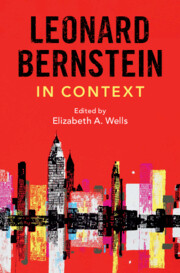Book contents
- Leonard Bernstein in Context
- Composers in Context
- Leonard Bernstein in Context
- Copyright page
- Contents
- Illustrations
- Musical Examples
- Contributors
- Preface
- Part I Bernstein’s World
- Part II Conducting
- Part III Composition, Creation, and Reception
- Chapter 11 The Crisis of Faith
- Chapter 12 Popular Music
- Chapter 13 American Sound
- Chapter 14 Exotic Evocations
- Chapter 15 Opera
- Chapter 16 Women, Gender, and Sexuality
- Chapter 17 Film
- Chapter 18 Early Shows
- Chapter 19 Late Shows
- Part IV Bernstein as Musical and Cultural Ambassador
- Part V Connections
- Part VI The Legacy
- Further Reading
- Index
Chapter 16 - Women, Gender, and Sexuality
from Part III - Composition, Creation, and Reception
Published online by Cambridge University Press: 06 April 2024
- Leonard Bernstein in Context
- Composers in Context
- Leonard Bernstein in Context
- Copyright page
- Contents
- Illustrations
- Musical Examples
- Contributors
- Preface
- Part I Bernstein’s World
- Part II Conducting
- Part III Composition, Creation, and Reception
- Chapter 11 The Crisis of Faith
- Chapter 12 Popular Music
- Chapter 13 American Sound
- Chapter 14 Exotic Evocations
- Chapter 15 Opera
- Chapter 16 Women, Gender, and Sexuality
- Chapter 17 Film
- Chapter 18 Early Shows
- Chapter 19 Late Shows
- Part IV Bernstein as Musical and Cultural Ambassador
- Part V Connections
- Part VI The Legacy
- Further Reading
- Index
Summary
As a socially and politically engaged composer, Leonard Bernstein created works for the stage that dramatize and explicate the changing status of women, gender relations, and heteronormative sexuality in the society around him. His Trouble in Tahiti (1951), for all its parodic hilarity, constitutes a powerful critique of bourgeois marriage under McCarthyism and establishes the garden as a recurring trope in his subsequent theatrical compositions. The woman-authored Wonderful Town (1953) turns a nostalgic eye on working women in 1930s Greenwich Village, and, elsewhere in Manhattan, West Side Story (1957) both advances the garden trope and gives us Anita, the wise and powerful Latina. In Trouble in Tahiti’s sequel, A Quiet Place (1983) the garden returns musically and textually to prompt a loving reconciliation between non-binary characters and the family patriarch, brokered by a woman.
Keywords
- Type
- Chapter
- Information
- Leonard Bernstein in Context , pp. 131 - 139Publisher: Cambridge University PressPrint publication year: 2024

